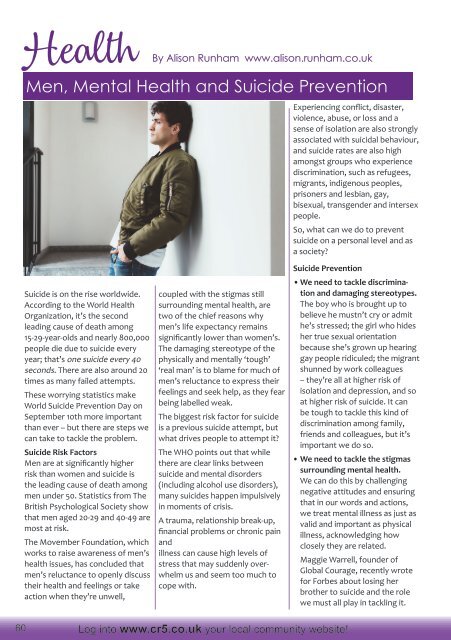CR5 Issue 160 Sept 2018
A local community magazine delivered free to 11,600 homes every month in the CR5 postcode. Contains local business advertising, interesting reads, What's on in the community and puzzles.
A local community magazine delivered free to 11,600 homes every month in the CR5 postcode. Contains local business advertising, interesting reads, What's on in the community and puzzles.
You also want an ePaper? Increase the reach of your titles
YUMPU automatically turns print PDFs into web optimized ePapers that Google loves.
Health By<br />
Alison Runham www.alison.runham.co.uk<br />
Men, Mental Health and Suicide Prevention<br />
Suicide is on the rise worldwide.<br />
According to the World Health<br />
Organization, it’s the second<br />
leading cause of death among<br />
15-29-year-olds and nearly 800,000<br />
people die due to suicide every<br />
year; that’s one suicide every 40<br />
seconds. There are also around 20<br />
times as many failed attempts.<br />
These worrying statistics make<br />
World Suicide Prevention Day on<br />
<strong>Sept</strong>ember 10th more important<br />
than ever – but there are steps we<br />
can take to tackle the problem.<br />
Suicide Risk Factors<br />
Men are at significantly higher<br />
risk than women and suicide is<br />
the leading cause of death among<br />
men under 50. Statistics from The<br />
British Psychological Society show<br />
that men aged 20-29 and 40-49 are<br />
most at risk.<br />
The Movember Foundation, which<br />
works to raise awareness of men’s<br />
health issues, has concluded that<br />
men’s reluctance to openly discuss<br />
their health and feelings or take<br />
action when they’re unwell,<br />
coupled with the stigmas still<br />
surrounding mental health, are<br />
two of the chief reasons why<br />
men’s life expectancy remains<br />
significantly lower than women’s.<br />
The damaging stereotype of the<br />
physically and mentally ‘tough’<br />
‘real man’ is to blame for much of<br />
men’s reluctance to express their<br />
feelings and seek help, as they fear<br />
being labelled weak.<br />
The biggest risk factor for suicide<br />
is a previous suicide attempt, but<br />
what drives people to attempt it?<br />
The WHO points out that while<br />
there are clear links between<br />
suicide and mental disorders<br />
(including alcohol use disorders),<br />
many suicides happen impulsively<br />
in moments of crisis.<br />
A trauma, relationship break-up,<br />
financial problems or chronic pain<br />
and<br />
illness can cause high levels of<br />
stress that may suddenly overwhelm<br />
us and seem too much to<br />
cope with.<br />
60 Log into www.cr5.co.uk your local community website!<br />
Experiencing conflict, disaster,<br />
violence, abuse, or loss and a<br />
sense of isolation are also strongly<br />
associated with suicidal behaviour,<br />
and suicide rates are also high<br />
amongst groups who experience<br />
discrimination, such as refugees,<br />
migrants, indigenous peoples,<br />
prisoners and lesbian, gay,<br />
bisexual, transgender and intersex<br />
people.<br />
So, what can we do to prevent<br />
suicide on a personal level and as<br />
a society?<br />
Suicide Prevention<br />
• We need to tackle discrimination<br />
and damaging stereotypes.<br />
The boy who is brought up to<br />
believe he mustn’t cry or admit<br />
he’s stressed; the girl who hides<br />
her true sexual orientation<br />
because she’s grown up hearing<br />
gay people ridiculed; the migrant<br />
shunned by work colleagues<br />
– they’re all at higher risk of<br />
isolation and depression, and so<br />
at higher risk of suicide. It can<br />
be tough to tackle this kind of<br />
discrimination among family,<br />
friends and colleagues, but it’s<br />
important we do so.<br />
• We need to tackle the stigmas<br />
surrounding mental health.<br />
We can do this by challenging<br />
negative attitudes and ensuring<br />
that in our words and actions,<br />
we treat mental illness as just as<br />
valid and important as physical<br />
illness, acknowledging how<br />
closely they are related.<br />
Maggie Warrell, founder of<br />
Global Courage, recently wrote<br />
for Forbes about losing her<br />
brother to suicide and the role<br />
we must all play in tackling it.

















